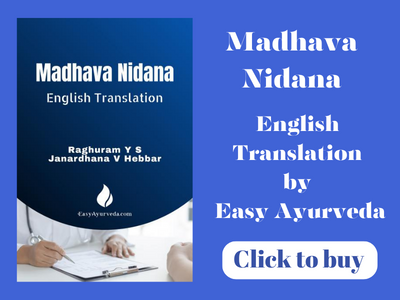Madhava Nidana Chapter 20 Unmada Nidanam
This article explains Madava nidana 20th chapter “Unmada Nidanam”. Causes, pathology and symptoms of Unmada are explained in this chapter.
Read – Acharya Madhavakara: His Work ‘Madhava Nidana’, Legacy, Amazing Facts
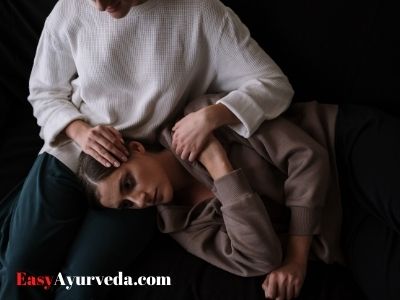
Table of Contents
Unmada Nirukti
Meaning and definition of unmada
Unmada is a disease in which the doshas which have undergone abnormal increase and traversing upwards (through the channels of the mind) get localized in the mind and cause its abnormality. (1)
Types of Unmada
Unmada is basically of 6 types. They are, one from each dosha, the fourth type is from the combination of all the three doshas, fifth from grief etc mind factors and the sixth type is caused by poisons.
The treatment of these shall be done in accordance and as appropriate to the cause. When unmada is not completely developed and is of recent onset it will be called as mada. (2-3)
Read – Unmada-Insanity: Ayurvedic Understanding And Management
Unmada Nidana
Unmada Nidana (samanya hetu) – common etiological factors of unmada
- excessive indulgence in foods which are incompatible, spoilt (contaminated) and unclean;
- showing disrespect to gods, preceptors (elders) and the twice born (Brahmans)
- affection of the mind due to sudden emotions like fear, joy, etc. and
- violent physical activities (4)
Unmada Samprapti
Pathogenesis of Unmada
In persons who are mentally weak (the sattvika quality of the mind has been immensely decreased), the doșhas having undergone abnormal increase invade and contaminate the hrdaya which is the seat of mind, get spread (lodged) in all the channels of the mind and bring about the derangement of the mind in quick time. This state of derangement of the mind is called as Unmada. (5)
Note – Hrdaya generally means heart. This word has also been mentioned to explain the brain. So, it has to be understood contextually. Therefore, it is good to consider hrdaya as the brain in this context of Unmada.
Read – Charaka Unmada Nidana: 7th Chapter
Unmada Samanya Lakshana
General symptoms of Unmada
The generalized symptoms of Unmada are – improper understanding and unsteadiness of the mind, in-coordination of sight (seeing here and there or not making eye to eye coordination without any reason), lack of courage (feeling of fear), irrelevant talk, and feeling of emptiness of heart (mind). (6)
Read – Best Natural Medicine For Mental Problems: Courage
Vataja Unmada
Causes – Vata gets abnormally increased in the body due to indulgence in foods which are dry, scanty (foods less in quantity) or cold, (frequent) purgation (inclusive of vomiting), depletion of tissues, fasting (starvation) and other factors.
Pathogenesis – This Vāta, in turn invades and further contaminates the hrdaya (brain) which has already been weakened (contaminated) by emotions like worry etc and further brings about derangement of intellect and memory, leading to manifestation of vataja unmada.
Symptoms – The signs and symptoms of unmada caused by abnormal increase of vata are –
- laughing, smiling, dancing, singing, speaking, making movement of body parts and weeping at improper time and place (unnecessarily and without any reason);
- hardness / roughness, emaciation, blackish red discolouration of the body and
- exacerbation of symptoms after digestion of food (7-8)
Read – Panic Disorder Causes, Symptoms, Treatment, Ayurveda Concept
Pittaja Unmada
Causes – Pitta gets abnormally increased in the body due to indulgence in foods which are not properly cooked, very pungent or sour, corrosive (cause heartburn), or those which are hot etc.
Pathogenesis – This aggravated pitta reaches the hrdaya – brain (which has already been weakened / contaminated by emotions like worry, anger etc) and affects the mind quickly as described earlier, in people who are not self controlled and further brings about derangement of intellect and memory, leading to the manifestation of pittaja unmada.
Symptoms – The signs and symptoms of unmada caused by abnormal increase of pitta are –
- intolerance,
- uncontrollability,
- casting away the clothes and remaining naked,
- threatening others,
- running away (to beat / harm others)
- feeling of excessive heat in the body (burning sensation),
- desiring shade, cold water and cold foods,
- yellowish discolouration of the body (9-10)
Read – Manovaha Srotas Description, Vitiation Symptoms, Treatment
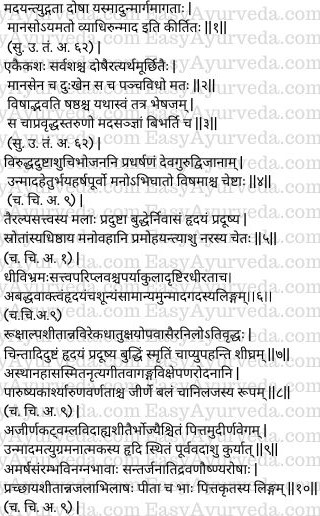
Kaphaja Unmada
Causes – Kapha along with pitta gets abnormally increased in the body due to excessive indulgence in over-eating, lack of physical exercise etc.
Pathogenesis – This Kapha (with pitta), in turn invades and further contaminates the hrdaya (brain) which has already been weakened (contaminated) by emotions like worry etc and further brings about derangement of intellect and memory, leading to manifestation of kaphaja unmada. This occurs on the backdrop of derangement of mind caused by kapha and pitta.
Symptoms – The signs and symptoms of unmada caused by abnormal increase of kapha are –
- slow / weak / sluggish voice (or talk) and body movements,
- anorexia,
- desire for women (or sex) and
- solitude,
- excessive sleep,
- vomiting,
- saliva dribbling out,
- symptoms pronounced immediately after taking food,
- whitish discoloration of nails, etc. (11-12)
Read – Depression Causes, Ayurvedic Treatment, Tips And Remedies
Sannipataja Unmada
Causes and pathogenesis – Sannipataja unmäda is produced by increase of all the three došhas together by their respective causes.
Symptoms – This condition is said to be very dreadful. The symptoms of all the doshas are seen in the patient. Since the treatment of this condition is mutually antagonistic (treatment to balance one dosha aggravates the other) it is regarded as incurable and hence treatment of this type of unmada shall be denied (refused). (13)
Shokadi Janya Unmada
Causes and pathogenesis – Getting frightened by (sudden appearance or presence) of robbers, government officials (like police, etc.) enemies and others (wild animals, weapons and anything causing fear), loss of money, death of relatives (next of kin such as wife, lover, sons, daughters, parents etc.) excessive desire for sex with beloved partner and not being able to obtain that and such other factors cause great injury to the mind and produce dreadful mental disorder – unmada.
Symptoms – Person so affected talks indifferently, which he likes most and sometimes reveals even the secrets hidden in his mind, sings, laughs or weeps on his own accord and behaves senselessly. (14-15)
Read – Should You Suppress Your Emotions? Do They Grow on You?
Visha janya unmada
Symptoms of Visha janya unmada
In unmada produced by poisons, the person will have red shot eyes, loss of strength of body, senses and complexion. He will have a sense of helplessness, black / bluish-black discolouration of the mouth or face and loss of consciousness. (15)
Read – Unmada Chikitsa – Charaka 9th Chapter
Symptoms of incurability of Unmada
Patient of unmāda who is found always keeping his head bent down or bent up, whose muscles have decreased (is emaciated), whose strength has been decreased (weak) and always awake (without sleep) is sure to die. (16)
General symptoms of Bhutonmada
Bhütonmāda (unmāda caused due to possession by “spirits”) is described as the disease in which the speech, valour, strength, activities, intellect and knowledge of the affected person are super-human and the time of onset of the symptoms is unspecific (not in accordance with that of the doshas). (17)
Devajushta Unmada
The symptoms of a person possessed by Deva Graha (Gods, Goddesses) are – contentment (not expressing any desires), cleanliness, desire for very pleasant garlands and scents etc. (excessive smell of divine perfumed flowers or flower garlands emitted from his body without the person applying any such perfumes), not getting stupor or sleep (always alert and / or awake), always speaking refined (cultured) language and truth, possessing bright complexion (on the face), unruffled (un-winking) eyes, bestowing favours and blessings and such other acts as seen (done by) in brāhmaṇas or respecting and worshipping Brahmanas. (18)
Read – Adravyabhuta Chikitsa Non-pharmacological Treatments In Ayurveda
Devashatru jushta Unmada
Symptoms of Devashatru (Danava / Asura) jushta Unmada (possessed by demons)
The symptoms of a person possessed by Devashatru / Danava / Asura Graha (Demons) are – heavily sweating, always abusing brahmanas, teachers, gods, etc. having distorted look (crooked eyes / squint), absence of any fear, always taking wrong paths to achieve anything (critical of everything), never getting satisfied with foods and drinks and indulging in sinful acts. (19)
Gandharvajushta Unmada
Symptoms of Gandharvajushta Unmada (possessed by Gandharva)
The symptoms of a person possessed by Gandharva are – always in contentment, loves to roam around river banks, gardens etc, indulging in good deeds (pure character), fond of good company, songs (music), scents, garlands, dancing with passion, laughing and speaking less (man of less words). (20)
Read – Mind – Qualities, Functions, Doshas As Per Ayurveda
Yaksha jushta Unmada
Symptoms of Yaksha jushta Unmada (possessed by Yaksha)
The symptoms of a person possessed by Yaksha are – red shot eyes, desire for beautiful, thin and red coloured dress, steadiness in all activities and quick pace (walking fast), very less speech, enduring any trouble (has good tolerance), bright complexion of the face (attractive), and enquiring others what they want from him (ready to help). (21)
Pitr jushta Unmada
Symptoms of Pitr jushta Unmada (possessed by Pitr – ancestor)
The symptoms of a person possessed by Pitr are – The person is engaged in the act of offering pinda (balls of cooked rice offered to the departed souls of ancestors / forefathers during ceremonial procedures) and water, on the seat prepared with kusha grass etc, by being calm and composed, and putting clothes etc on his right shoulder. He has developed desires towards foods prepared with mutton (meat), sesame, jaggery and milk puddings (sweets prepared in milk base) and is also a devotee of pitr (respects them immensely). (22)
Sarpa / Bhujanga Graha Jushta Unmada
Symptoms of Sarpa / Bhujanga Graha Jushta Unmada (possessed by snakes)
The symptoms of a person possessed by Sarpa / Bhujanga Graha are – The person afflicted by this graha is seen moving on the ground lying on his chest, just like a snake does, keeps licking his lips with his tongue, is extremely angry, and develops desire for jaggery, honey, milk and sweet dish prepared on milk base. (23)
Read – Sattva Pariksha Examination Of The Mind, Tolerance
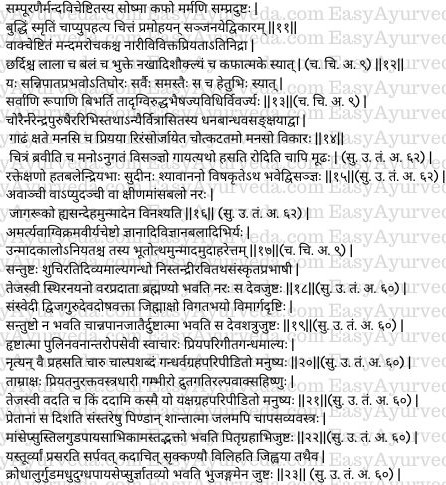
Rakshasa Graha Jushta Unmada
Symptoms of Rakshasa Graha Jushta Unmada
The symptoms of a person possessed by Rakshasa Graha are – This person possessed with Rakshasa Graha will show immense desire for foods prepared with meat (mutton) and blood, and various types of alcohols / intoxicating drinks. He is devoid of shyness; very cruel and very courageous (brave). He gets very angry and also has great strength. He roams around at night time and hates cleanliness. (24)
Pishaca Graha Jushta Unmada
The symptoms of a person possessed by Pishaca Graha are – the person is always seen keeping his shoulders elevated or keeping himself naked, is emaciated, speaks irrelevantly with intermittent gaps, emits bad smell from his body, unclean, greedy, eats large quantities of food, roams around in deserted forests and uninhabited places, who does untoward (weird, opposite) activities, and roams around weeping loudly all alone. (25)
Read – Daiva Vyapashraya Chikitsa – Divine Therapies of Ayurveda
Symptoms of incurability in unmada
- Bulging out of the eyes
- running / walking fast,
- licking the froth (saliva) coming out of his mouth,
- sleeping in excess,
- falling off suddenly,
- has tremors,
- unmada caused due to fall from a mountain, back of an elephant or tree,
- unmada persisting for 13 long years (any type of unmada which is 13 years old) (26)
Periodicity of attack of different grahas
- Deva grahas seize the person on full-moon days,
- Asura grahas seize the person in the mornings (junction of night and early morning) or evening (junction of noon and evening)
- Gandharva grahas seize the person on the eighth day,
- Yaksa grahas seize the person on the first day,
- Pitr grahas seize the person during the dark half of the month,
- Naga grahas seize the person on the fifth day,
- Rakshasa grahas seize the person during nights and
- Pisaca grahas seize the person on the fourteenth day. (27-28)
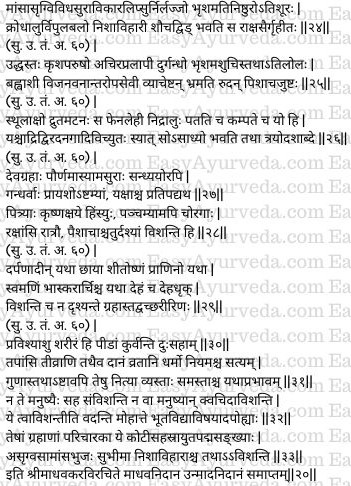
Analogy to describe the attack and presence of grahas
Just as an image enters into the mirror, the heat and cold which are invisible enter our body, the sunrays enter the suryakanti gem (or the heat enters the fire), the soul which cannot be seen enters the physical body and all these cannot be perceived by our physical eyes. We cannot see these happening. Similarly, the grahas also enter the human body but cannot be seen or perceived by our physical eyes. Though the grahas are present in the body they cannot be felt or seen. (29)
Read – Graha Roga: Psychiatric Disorders of Children
Entry and existence of (attack, seize) grahas as explained by other texts
Having entered the body (being invisible), the grahas (spirits) create intolerable sufferings. (30)
Observance of austerities, charity, vows, right conduct, rigid discipline, truth, the eight extraordinary capabilities — are the qualities always found in the grahas, more in deva graha and less in others. Depending on the graha and their impact, the above said qualities are present either partially or in entirety. This means to tell that these qualities are found partially (few) in asura etc grahas and in entirety (full, almost) in deva graha. Being endowed with these good qualities the deva graha etc do not sit along with human beings nor do enter the unclean bodies of the human beings all by themselves. But those who still, due to ignorance, say that these grahas enter the human body, should be considered as having absolutely no knowledge of bhuta vidhya i.e., demonology. It is in fact the thousands and millions of servants or retinue of the grahas, who are fond of blood and flesh, who are very terrific and who roam about at nights, which enter into the human body and take possession of the person. (31-33)
Thus ends the chapter on Unmāda Nidanam in Madhava Nidana text written by Acharya Madhavakara.
Read – Counselling – Types, Benefits, Myths And Facts
Ashta Siddhis – The eight extraordinary capabilities are
(1) Anima – capacity to assume minute size
(2) Mahima – capacity to assume very huge size
(3) Garima – capacity to become very heavy
(4) Laghima – to become very light
(5) Prapti – obtaining any desired thing
(6) Prakamya – fulfilling all desires
(7) Isatwa – over-lordship on anything and
(8) Vasitva – subjugating or controlling anything
According to another version, the extraordinary powers are –
- Capacity to enter into the body of another person
- Extraordinary sense perception
- To understand all sounds or meanings of all words / language
- Capacity to see
- Hear and
- Remember things which are impossible by others
- Unusual bright complexion and
- Capacity to vanish out of sight-are the extraordinary powers.
Read more about Ashta Siddhis




